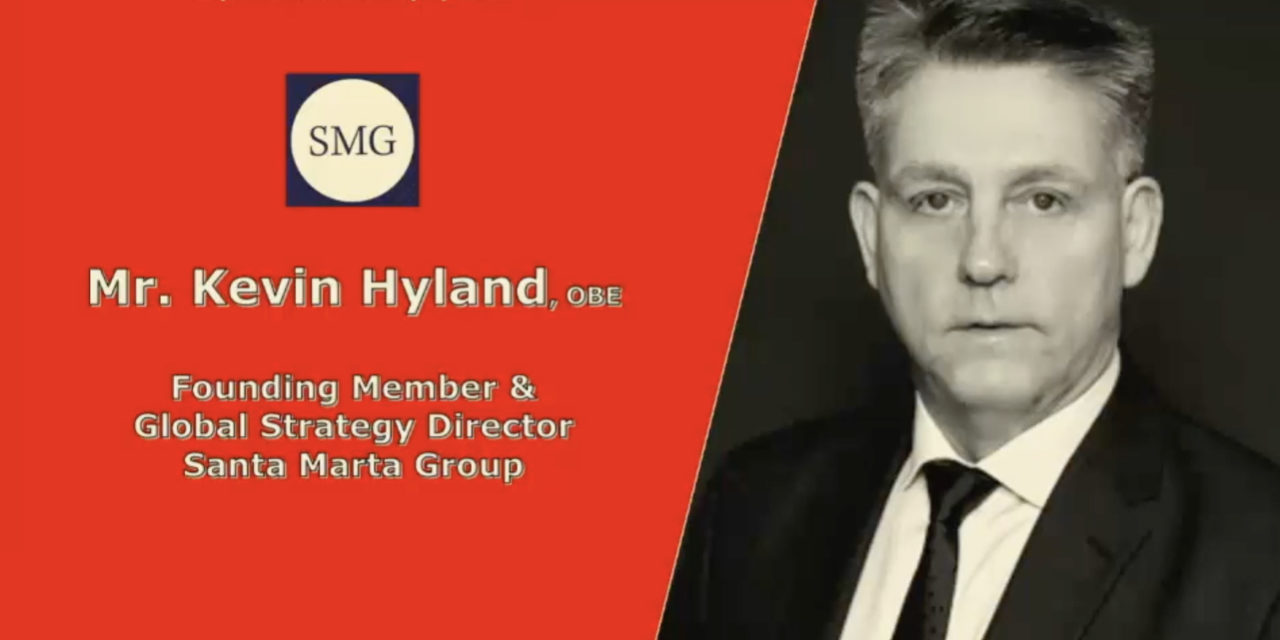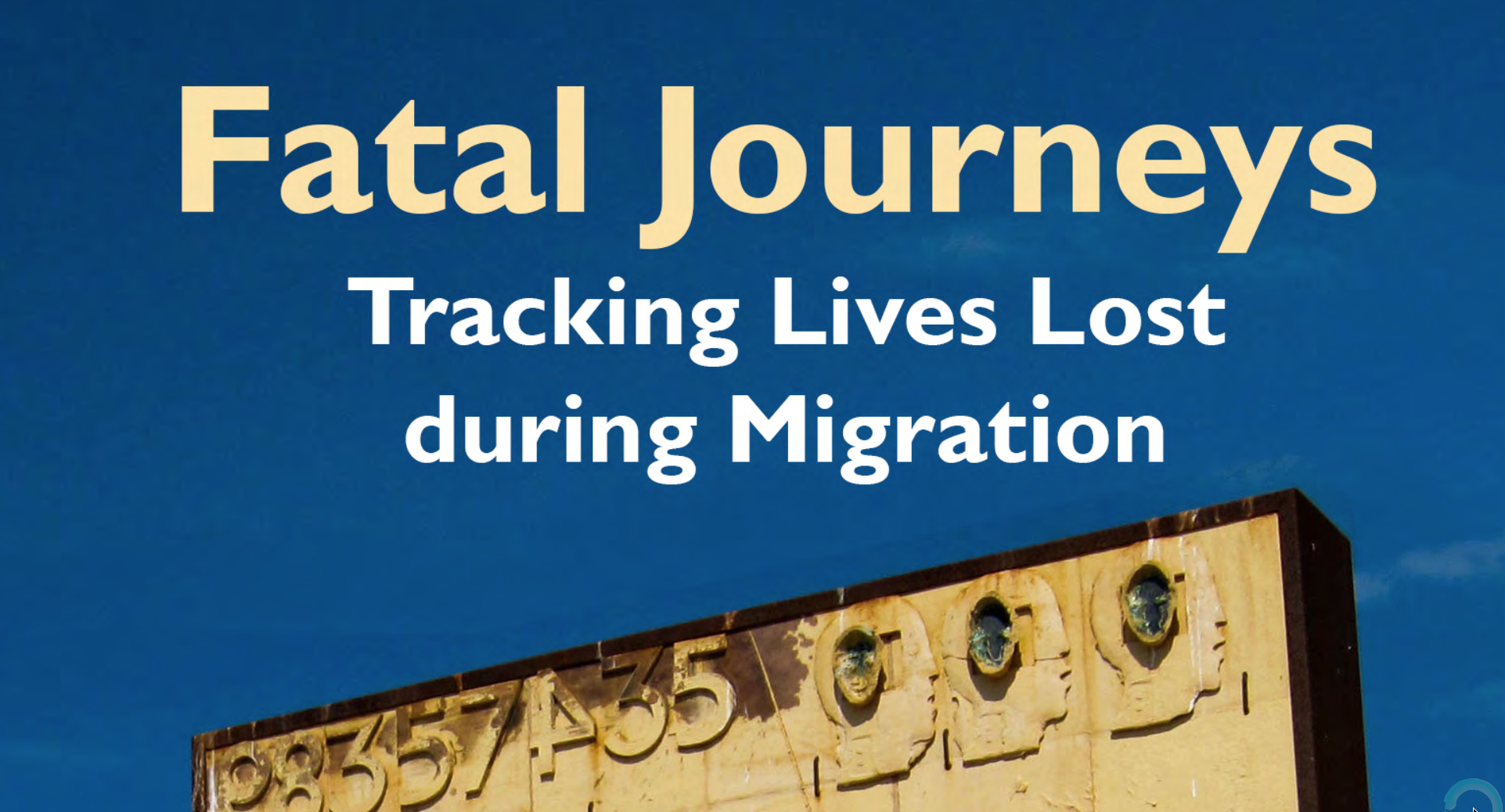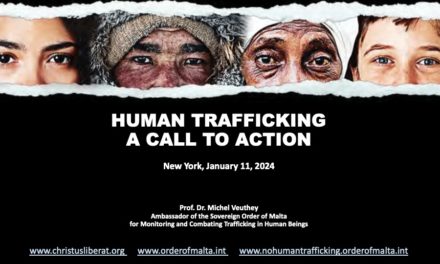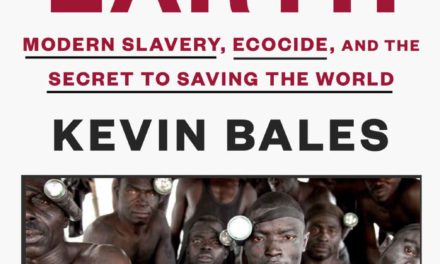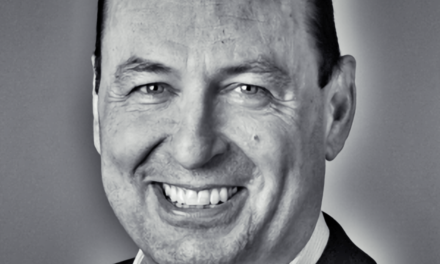Links to download full text intervention in English, French, German, Italian, Russian, Spanish, Simplified Chinese:
https://kdrive.infomaniak.com/app/share/111675/2eaf922f-ba7b-4768-b80d-8559f0ec5d14
Kevin Hyland highlights crucial lack of resources to combat trafficking. The G20 countries should devote at least 30 billion dollars to the fight against human trafficking, instead of 1 billion today! That may seem like a big ask, but the United States spends somewhere in the region of 100 billion a year on the fight against drugs. This is still a small ask.
The conference was organized by the Permanent Observer Mission of the Sovereign Order of Malta to the United Nations in New York in collaboration with Global Strategic Operatives, and co-sponsored by the Permanent Missions of France, Mexico, Liechtenstein, Mexico, Nigeria, the Philippines as well as FAST Initiative (Finance Against Slavery and Trafficking).
Kevin Hyland is Founding Member and Global Strategy Director of Santa Marta Group which is an alliance of police chiefs and bishops from around the world working together with civil society to eradicate human trafficking and modern day slavery. 30 years experience of police investigation. From 2010, Head for the establishment of the Metropolitan Police Human Trafficking response in UK and from 2014 to May 2018, first Independent Anti-Slavery Commissioner for the UK government, from 2018, Ireland’s representative to the Council of Europe Independent Group of Experts for Trafficking (Greta).
TRANSCRIPTS OF THE UN NEW YORK HEADQUARTERS SIDE-EVENT
JANUARY 11, 2024
HUMAN TRAFFICKING PREVENTATIVE STRATEGIES AND CARE OF VICTIMS
Transcript of Kevin Hyland’s presentation
OPENING REMARKS:
H.E. Dr. Paul Beresford-Hill, Permanent Observer of the Mission Sovereign Order of Malta to the UN, New York
Speakers:
- E. Dr. Michel Veuthey, Ambassador to Monitor and Combat Trafficking in Persons, Sovereign Order of Malta, Geneva, Switzerland
- Deborah O’Hara-Rusckowski, DM Special Advisor on Human Trafficking for the Sovereign Order of Malta to the UN, NY; Founder & President, Global Strategic Operatives, The O’Connell House
- Kevin Hyland, OBE, Santa Marta Group, London, Founding Member and Global Strategy Director of Santa Marta Group which is an alliance of police chiefs and bishops from around the world working together with civil society to eradicate human trafficking and modern day slavery. 30 years experience of police investigation. From 2010, Head for the establishment of the Metropolitan Police Human Trafficking response in UK and from 2014 to May 2018, first Independent Anti-Slavery Commissioner for the UK government, from 2018, Ireland’s representative to the Council of Europe Independent Group of Experts for Trafficking (Greta)
- E. Mr. Antonio Manuel Revilla Lagdameo, Ambassador Extraordinary and Plenipotentiary and Permanent Representative of the Republic of the Philippines to the United NationsH.E. Anna Ekstedt, Ambassador for combating Traffikcing in Persons, Sweden
- E. Mrs. Diarra Dime-Labille, Minister Counsellor, Permanent Mission of France
- Mauricio Reza Bautista, Attaché & Human Rights Expert, Permanent Mission of Mexico
- Hilary L. Chester, Ph.D., formerly with the US Conference of Catholic Bishops (USCCB)
- Alice Eckstein, Project Director, Finance Against Slavery and Trafficking (FAST)
KEVIN HYLAND: Your excellencies, distinguished guests, it’s a pleasure to be here in New York and here at the United Nations, albeit we’re talking about a subject that should be into the history books by now. I would like to particularly thank Ambassador Beresford of the Sovereign Order of Malta, and Mexico for convening this very important and timely event. Our collective global efforts to end human trafficking and forced labour in all its forms, owes much of its development to the international instruments of the United Nations and the efforts of diplomats here in New York and in Geneva. The many UN agencies that work to end human trafficking and the issues include looking at development, rule of law, environment, equality and equity, child development and democracy. Of course, there needs to be a special recognition of those who work on the front line, identifying, supporting and reconstructing the damaged lives of victims of those crimes all over the world, many of whom are religious sisters, many of whom are women who are putting themselves at risk to protect others. But next year, 2025 will mark a quarter of a century since the introduction of the UN Palermo Protocol to suppress human trafficking. The record on interventions at the international level go right back to 1930 and the UN Forerunner, the League of Nations, when it committed to address crimes and human rights violations that fall under the human trafficking umbrella. Of course, since those days and since 2000, with the UN Palermo Protocol over 170 countries have outlawed human trafficking, and multilateral establishments such as the EU, the Council of Europe and others have introduced binding conventions or protocols. Furthermore, other multilateral bodies such as the OSE, the ICMPD, the African Union, Europol, Interpol and the Association of Southeast Asian Nations and others have committed to eradicate human trafficking. Of course, all UN member states have agreed to the Sustainable Development Goals in 2015, launched in this very building by Pope Francis. Within those goals is a target to end human trafficking as a priority. However, as we reach this 25–year anniversary and we reach ten years into the 15 years duration of the Sustainable Development Goals, we have to ask ourselves, have we made progress over the last quarter of a century commensurate to the seriousness of the issue and the risks it creates for children, women and men and entire communities and national security? Since that same time 2000, technology has advanced beyond our imagination. Our fear of the collapse of IT systems as the new millennium began were unfounded. Look at now how AI and IT have moved in that same time frame. Also global trade and the movement of people, medical science, financial flows, air travel and many other phenomena have increased beyond our imaginations and very often beyond our expectations.
Yet, by comparison, approaches to human trafficking have remained stagnant. The absence of proper intelligence gathering by countries, monitoring of cash flows, use of data and identifying choke points where human trafficking can be prevented are contributors to the position, as highlighted by the US State Department in 2022, where it revealed only 5600 convictions of trafficking worldwide. Evaluating this data against the ILO–endorsed estimates of there being 50 million people across the world in exploitation, this means that there is a 99.98% chance of impunity, almost the perfect crime. With only 115,000 victims identified globally in 2022, this supports the UNODC’s assertion that less than 1% of victims are identified each year.
What could be done to change the vacuum of effective measures to drive the suppression and prevention of human trafficking and place responses systemically into the heart of country strategic plans and operational implementation? Of course, we’ve heard excellent examples of that from Deb O’Hara. But to guide this aim, the Santa Marta group has introduced and is promoting a six–point strategic plan. These six points start with government procurement and businesses. Government procurement should not have any trafficking in it whatsoever. That is taxpayers money. No government has been authorised to give money to criminals. There are measures they can implement to actually make sure that government money does not end up in the hands of traffickers. Businesses. Businesses around the world benefit from human trafficking. This may be because they turn a blind eye, but it will always be when it happens, because they haven’t got effective measures. We need to turn that so that businesses are held responsible for what happens in their supply chain. We have the luxury of being privileged people, and if we buy an item and it’s defective, we can get a refund. If my plane was late coming to the United States from a European country, I get compensation of €600. If you’re a traffic victim, and you’re identified, you’re not entitled to either of those, and nothing like it. But also, there are countries that have started to look at government procurement and supply chains. The UK, Australia, France, Germany, Canada and the EU. Of course, Germany is the first country to add a sanction to those who breach the rules and have human trafficking in their business. The second point Santa Marta wants to see introduced is this notion of tainted money, removing the benefits, which are currently estimated at over $150 billion every year. Tainted money is more than criminal assets and criminal benefit. It’s the profit that is made by trafficking, the profit of the things that are sold in supermarkets, the things that are sold across the world in government procurement, the use of flats for brothels, all of these things where there’s profits being made by someone in that chain should be up for grabs, and that money should then be used as reparation, victim support, and in the fight against human trafficking. People say, this is really difficult. We already do it for counterterrorism, so we can do it for human trafficking. Technology platforms must be regulated and governed by law. An example is the European data protection laws bring sanctions if you breach the data protection, even if nobody’s put at risk. For example, in Ireland, under the GDPR rules, a major platform was fined €1.4 billion for breaching data rules. Ireland has just introduced new legislation and a commissioner who will actually monitor these platforms to make sure there are no things on there, like children being abused, like crime being supported, and thankfully, that will include human trafficking. We need to see that worldwide, not just one small European country. Also, international instruments, as we heard from Ambassador Vufi, need to be better understood and implemented. The many instruments that are there that have been agreed by countries but are not being implemented. As our fourth priority, Santa Marta want to see them put into place. Also we want to see international institutions, the UN, the EU, the Council of Europe, the World Bank, OECD, ILO, the World Health Organisation all start to play their role at a strategic level, talking about prevention. We can do it, as we saw during the recent Covid crisis. The 6th one, and this is very much something that the Cardinal who is the president of Santa Marta, Cardinal Vincent Nichols, always says, we cannot achieve the other five unless we acknowledge this one.
We have to show proper moral leadership as individuals, but also as decision–makers, because none of this will be delivered without leadership that becomes transparent and thinks about people at the heart of what they’re doing. We’ve come up with a plan as Santa Marta, but how are we going to ask for this to be delivered? We are working very closely with the G20 and partake in what’s called the G20 Interfaith alliance, which feeds into the leaders recommendations.
What we want to see is by 2030, at the time when the SDGs come to their end, collectively, the G20 countries are spending on infrastructure 30 billion each year in the fight against human trafficking to achieve sustainable development goal 8.7 and others. That may seem like a big ask, but the United States spends somewhere in the region of 100 billion a year on the fight against drugs. This is still a small ask. When I speak to people at different governments and people at senior positions, including politicians, they accept that 30 billion globally being spent on this by G20 countries, the richest countries in the world, which includes the EU and now the African Union, is the minimum that should be spent.
Currently, it’s hard to get to a collective 1 billion being spent by governments. Why must we do this? Well, the 50 million people, and of course, it happens in our developed nations as well as the global south. But people like the girl I met in Sicily from Eritrea, 15 years of age. When she arrived into Italy, she was seen as a migrant, another person, landing in Europe, looking for an opportunity. Until you hear her story that she’d been repeatedly raped whilst in Libya and been sold at markets and was kept in what’s called connecting houses. It was only when she had worked off her value and there was a seat on a boat that she was then discarded by the criminals. That’s one of the 50 million. We can talk about those all the time, but we need to make sure that we have a systemic approach, that by the time we hit the end of the sustainable development goals, that we can say it’s starting to be effective and we can stand in front of that girl who comes from Eritrea and say, we really did our part. That then we get to the point where we don’t see these girls coming from Eritrea, because we support them and we take the accountability to those who are allowing and encouraging and benefiting from this phenomenon of human trafficking and modern slavery. Santa Marta Group is committed to doing this. We’re very lucky to be able to work with the order of Malta and many other organisations across the world and countries. From the cardinal and from the patron of Santa Marta, Pope Francis, this is something that we are determined to drive home. We hope that we can perhaps stand here in 2030 and say, yes, we’re making a difference. Thank you very much.
QUESTION 1 — PM OF HOLY SEE: Hello, my name is Max, and I’m with the Holy See Mission. Excellent, Max. First of all, thank you very much for organising this fantastic event on a very critical issue today. I also wanted to congratulate Sovereign Order of Malta on the opening of the O’Connell House, which is a very exciting news and also the success of the GSO Human Trafficking and Protocol Policy. Thank you. My question regards to impunity, especially we heard today 99.98% impunity. That’s quite concerning number, and it was also mentioned by Ms. Bola, delegate from Nigeria, also a good friend of mine, that gaps in enforcement measures play a role on this statistic. I was wondering, I was interested, I’m not sure who would best answer this question, but about your thoughts on fighting impunity and how member states and the international community can better address this issue in this regard. Thank you.
KEVIN HYLAND: Yes. The issue with the low rates of conviction and the low rates of identification are fundamental to this particular issue in the fact that this is where there is enormous failing. I think that when you look at the whole agenda very much, it’s designed to respond after the event. There’s not enough in prevention and in many areas of criminal justice. The prevention, the legislation allows for intervention at very early stages of when a crime is hatched. For example, when it involves drugs, conspiracies, when it involves terrorism, when it involves gun crime and all those things. But that takes a certain way of approaching those crimes by the agencies like national security, law enforcement, and the way that that is coordinated with the public and the public’s perception of what that is. We don’t want everybody walking around terrified that there’s going to be another terrorist attack, but we want them to know what to do if they see something that they think may be connected to something that’s terrorist–related or any other crime. Many of the things that would normally sit under the jurisdiction of statutory agencies and law enforcement and many of the international protocols that should enact governments and government agencies to do certain things have in many ways been outsourced, and they never get into the system. As I said in my presentation, 25 years on, we’re talking about very low numbers of statutory agencies having training. We’ve got very poor policies. Even in countries like the United Kingdom, that’s got a very good piece of legislation around human trafficking. Most law enforcement agencies, health services, local authorities don’t have policies that look at crime prevention, crime responses and the care of victims. A proof of that is the fact that last year in the United Kingdom there was almost 17,000 victims, potential victims identified. It’s taking on average two years for somebody to be formally recognised because it’s outsourced to the home office, as opposed to where every other crime would sit, which would be in policing, working with NGOs to provide the care. I think we need to look at the policy approach and then start to accept actually, things that we say may not help the agenda. I’ve been to Nigeria a number of occasions and worked on investigations in Nigeria with NAPTIP of victims who have ended up in the UK. When I went to Nigeria, what I found was this perception that victims would never talk to the authorities. It was not true in every case. It was how they were spoken to and who was engaged in it. Building the trust, as we did with religious sisters, and then the victims felt happy and safe to either give us information or intelligence, or actually as it was, to come back to the UK and give evidence in court. I think we need to really look at these policies and work out that if we are always saying, “Well, victims will never engage with the state,” then that’s what will happen. They won’t engage with the state. We maybe have perceptions that we need to revisit, particularly when we see the progress that is being made on legislation like we heard from Mexico and the financial. That’s the other thing, the way that you would approach another crime, you would look at all the other opportunities. Where are the opportunities to get evidence that aren’t reliant on a victim? I think that it’s that policy approach and when we get to that point where we are looking at it, at the most serious level, we will see an increase in prosecutions, convictions and confidence on the entire issue.
QUESTION 2 — PM of MOROCCO: I’m Hanaa Bouchikh, Counsellor at the Permanent Mission of the Kingdom of Morocco. First of all, I’d like to pass the greetings of Ambassador Hilale, who attended the first hour and heard many esteemed panellists. But unfortunately, he had to leave us to attend another engagement and to chair meeting. At the outset, I would like, of course, to welcome the convening of this timely meeting and to commend all the panellists and keynote speakers for their intended patience and for their insightful briefing. Would like to seize this opportunity to express our appreciation, of course, to Ambassador Bursfeld, and all esteemed panellists for, of course, presenting remarks on the reach of human trafficking to multiple areas, mostly labour, workforce, migration, and the list goes on. Given time constraint, I will not elaborate on Morocco’s ongoing efforts on combating all types of human trafficking nationwide. But I will seize this opportunity to present two questions, if you allow me. First one, what are the recommendations you could have to better understand the link between migration and trafficking in persons to develop more effective responses and to eliminate the risk of trafficking in the migration process, especially to protect migrant workers from all forms of violence and discrimination? The second question, as we all recall, at the high level meeting of the General Assembly in 2021, we adopted a political declaration on trafficking, on combating human trafficking. In that political declaration, member state committed to taking immediate and effective measure to eradicate forced labour and to secure the prohibition and elimination of forms of child labour, including the recruitment and use of child soldiers, and by the 2025 to end child labour in all its forms. My question is, is this objective still achievable by 2025? What are the needs to be done to counter the exploitation exercise by armed groups to force children to act as combatant? –Thank you. –Thank you.
KEVIN HYLAND: Well, I think the political declaration which reiterates the SDG 8.7 and the ambition, and I think by 2025, are we going to achieve what was anticipated in 2015? Probably not, because the progress hasn’t been at the stage that it should be. We know that child labour is still an enormous problem, and the use of children and people for forced labour is defined in military situations, is a serious problem. But I think when we look at things that can happen and are developing, like involvement of the private sector and involvement of governments and the commitments that we’re seeing, the African Union becoming part of the G20 is an enormous step forward. I think that’s what we need to place our hope with and to inform those bodies. Do we have the chance of reaching 2030 when trafficking is no longer here? We certainly can get to the point where the model is broken and that everybody sees it as something that has to be prevented. Of course, criminals will be criminals because trafficking is a crime. It’s a deliberate act. I think that we can achieve by 2030 the breaking down of this model. Then as we lead into the next iteration of global goals that will obviously be launched in 2031, we need to be far more committed and have the plan in place so that the following ten or 15 years does actually see the eradication.
QUESTION 3: I would like to thank the Sovereign Order of Malta. Questions on monitoring and interdiction, I think we’ll all agree mapping, and metrics, and shared intelligence are key. Is an overall picture emerging of trafficking origins, routes, and modes of transportation? If so, can this clarity continue as trafficking morphs and changes over the years?
KEVIN HYLAND: Yes, there is a global slavery index produced by a charity in Australia, and it’s accepted by the UN. It does show those trends. One of the things it shows as well in it, the most recent is the relationship to trade and business. It shows where the opportunities of intervention are. But we need to move to that point of the intervention. That should be where we’re looking at policy. I just wanted to talk about the issue that was mentioned earlier about migration. Of course, Ambassador Veuthey is absolutely right. It is a tool of the traffickers, and it’s a wonderful thing when they have the whole place that’s disorganised and they can go in and get their fruits. But I was very lucky recently to go to Brazil last year and see the work of the Stella Maris, of the Scalabrinis, and to see how they were dealing with it, having this incredible centre, The heart of one of the things that was so important was to give people status to stay there and to give them jobs. Through the Scalabrinis or the Stella Maris, they had a whole network of opportunities for work for people. Once people felt valued and were giving something back to community but doing something for themselves, all of this suspicion around these migrants, like we might be in Europe, disappeared. I just saw what was probably one of the best models I’ve ever seen for dealing with vulnerable people who arrive looking for protection. Certainly from the work of Stella Maris, they were getting it.
QUESTION 4: sorry, my name is Hunter Severini and I live in New York City. I appreciate your giving me a chance to participate in this discussion, and I hope attendance continues to grow in these meetings. I think it’s a very important topic. It’s nice to see people taking the time from their day to be here. My question is basically how we can be better advocates to local, state, national, and international governments to compel them to address trafficking problems that they have already acknowledged. I’ll give some specific examples just to be a little clear about what I’m talking about. The reason I’m bringing it up is because I think so much trafficking is not visible. The fact that we apparently can’t even succeed in a lot of cases in addressing some of the most blatant examples, makes me really question a lot of the current approaches that are being made towards trafficking, and the fact that it makes me think that we could be doing a lot better. The first example I’ll give is here in New York City. I’m not sure exactly for how long, but I know for quite some time, Roosevelt Avenue in Corona, Queens, has become a sex tourism, prostitution, and presumably sex trafficking hotbed. It’s gone viral on the Internet. There are now tour videos you can watch which explain the neighbourhood to people, what the prices are like, how to approach girls there. Eric Adams has acknowledged this. He mentioned a bit ago that he took a drive to this neighbourhood, and that he’s a former subway cop, and the guy has been around a bit. He’s acknowledged that there is definitely a big prostitution problem there. Yet, in spite of this, I can pretty much promise, even though I haven’t seen it myself maybe for a couple of months, it’s not an area I’m around a lot, but I can pretty much promise that this is operating right now. It’s a basically 24/7 market. People that are interested can definitely find a lot of information about this in the media and on YouTube. It just disheartens me a bit, because I feel like if we have these… So much trafficking is not visible. Yet when we have these examples that are so obvious and so acknowledged, I don’t know how much more attention it necessarily is going to take to get something done about this. But I believe that there really does need to be a little bit more attention on this. I’ll give another example, which is a little more international. I think it’s a nice contrasting example because it’s also a big problem, but it’s also much further away from us. In Germany right now, you have this big expansion of what’s called these mega brothels. A lot of them offer things like unlimited service that seem particularly morally outrageous to me. I think that the government has done a lot, whether actively or passively, to encourage sex tourism. I think that Germany has significantly overtaken the Netherlands now. I think it’s becoming one of the world sex tourism destinations, probably because of that sex trafficking. I can only assume what the articles that I’ve read are telling me, that basically Germany is getting completely flooded with more sex workers than people even know what to do with, and the government seems to be just encouraging this more and more. I guess with these two examples in mind, I’d just be curious to know what we can do to call this out a little more. Because it’s not like this is going on in secret, but they’re putting an argument out in public which justifies this, when in reality, I see a huge potential for harm as part of all the things that I’ve mentioned. I would just be curious to hear from some of the panellists, if they have any ideas particularly to these kinds of situations, and what we can do to help advocate for the countless victims that are surely part of all this.
KEVIN HYLAND: Yes. You hit on a very important point that we know where this is, we see it there, we haven’t got to go and look for it that hard, and it’s there and nothing happens. That demoralises– All of us. –the issue, but it also enables another enabler for the criminals, that it’s good business to be in. But what we have done at Santa Marta, with our community work that we are doing with parishes and dioceses, and not just from the Catholic Church, but from communities, is we’ve changed the approach of what we’re asking people to do. What we’ve done is created a training manual which they can take and use themselves as well. But it’s about them asking their community leaders— their elected officials, their members of parliament, their police chiefs, their police and crime commissioners, who are like mayors in the UK, and local officials— “What are you doing? How are you implementing the Modern Slavery Act in the UK? How are you implementing the sections that say there’s got to be support for victims? What is your prevention plan?” Asking those questions and getting serious answers. When we started doing this, which was only quite recent, the communities felt, actually, we are really getting involved in this, and we feel that we’ve got a part to play. Of course, when we were doing it, particularly with the Catholic Church, the bishops and the parish priests said actually, this is really good, because it’s not saying that we should bring another centre, which could be very expensive, lots of risk. We’re actually making and asking and requesting and creating the accountability in local communities. We’ve started that, and we’re pushing that across the UK this year, and into Ireland. We’ve had lots of buy–in from law enforcement, from government officials and police and crime commissioners. But to your point around street prostitution, when the 2012 Olympics was happening in the UK, there was this fear that street prostitution was going to make London look nasty. Some were approaching it with, “We’ll go out and we’ll arrest all the prostitutes, the women in prostitution,” or we’ll do this, do that, curb crawling operations and all that. But what I did was I got a team together which consisted of religious sisters, mainly from the Mercy Sisters and others, and the National Health Service, local authorities, and we put in a prevention plan. The women that were working were then directed into a centre where they were given pathways. This model is very much copied and promoted now by an organisation called Arise, which I’m very pleased to be part of now. The vice–chair is here as well. They use that model about how you can educate communities to, in effect, take away the interest of this or make it something that doesn’t exist. But also, Scandinavian countries in particular, have introduced laws of the buyer pays, which is about people who buy sex, then can be arrested and fined. In Sweden, for example, the penalties are quite high. There’s a number of ways of suppressing. The one thing you can never do and must never do is to target the women who are working in prostitution. They need to be dealt with as victims and people that need pathways. Doesn’t mean they’re always going to be easy to work with, but we need to give them opportunities. In Germany, I’m really pleased to say there is a bit of a shift in the government there, and they’re starting to look at the believe it or not, the Scandinavian models. There is a real push from certain members of parliament, certain ministers, and they do realise now that what they’ve got of this commercialisation of these mega brothels has really destabilised certain communities and attracted other forms of crime, which is exactly what’s happened in Amsterdam as well, that this kind of model. Also, we’re always pushing, quite rightly, equality, women’s rights. Does that mean we want to see women on sale in high streets? Is that what we want our young boys and men to actually view women as? Of course it can’t be. I think there are models that are around the world that could be incorporated, could be learned from and then actually implemented into policy, deliverable policy that’s actually happening on the ground, and there are ways to do that. But unfortunately, at the moment, they’re not happening on any scale whatsoever.
KEVIN HYLAND: It was something that was highlighted when we were doing the work around the Olympics, around creating a wall of shame. There was this suggestion that names were going to be put on the sides of buses and things like that. Of course, in our jurisdictions, in our democracies, justice is in public. What goes on in the courts can be reported unless there’s particular reasons of risks to children or individuals, but the circumstances can still be reported. I was the one who actually stopped them doing the names on the buses and the wall of shame. My reasoning was, that may be a father who’s out with a woman who’s providing sexual services and paying for it, which, there is a justice solution to that. But that father could also have a 12–year–old daughter at school, a 9–year–old son, and they go into school the next day and they become the victim of their parents. What we did was we amended the legislation so that particularly if it was done from a car, if somebody goes out in their car to pick up women who are providing sexual services, we got the power to take the car away that became involved in criminality. Then the guy might have gone home and tried to keep it from his wife or his partner or his family, keep the charge sheets hidden away and hope and hold their breath. But actually, to go home and not have your car really hurt them. That could be a brand–new car. I mean, I know on one occasion it was a very expensive car that was taken to the value of £100,000. I think there’s other ways of doing it. Name and shame, I get it. Anything that happens in the courts generally can be public. But I think about the bigger damage it could do to young girls and young boys and people who are completely innocent in any way, shape, or form. It also shows that we’re being a little bit vengeful as opposed to following a rule of law.

